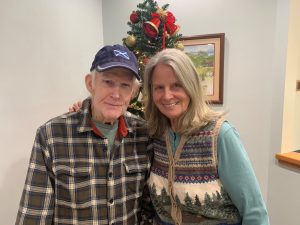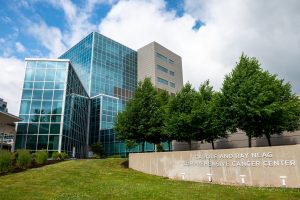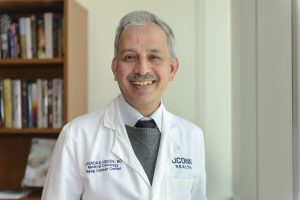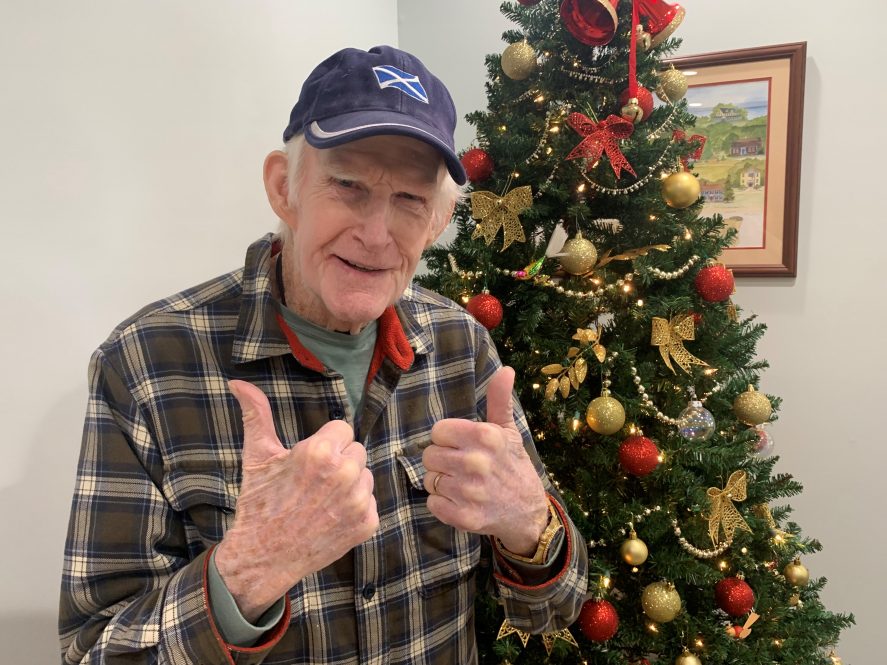William Holley, 80, of Ellington, and his wife Jonell are having an extra special Christmas with their family this year.
One year ago Holley was facing the unimaginable. Surgeons were considering options including a possible amputation of his right hand and wrist to stop the growth of a large, and deeply spreading squamous skin cancer.
Holley is higher risk for skin cancer due to his age, fair-skin and red hair.
“The growth on Bill’s hand that was originally diagnosed as just a wart just kept getting bigger and bigger,” recalls Jonell, who was strongly advised by a local dermatologist after close examination: “You have to go to UConn.”
Thankfully UConn Health surgeons referred Holley first to Oncologist Dr. Upendra Hegde and his team to see if there were any other available treatment options possible at UConn Health’s Carole and Ray Neag Comprehensive Cancer Center’s Melanoma and Cutaneous Oncology Program.
“Why don’t we try immunotherapy first, before considering major surgery or amputation,” Hegde advised Holley and his family.
“One year after immunotherapy treatment I am happy and thankful to report that Mr. Holley’s aggressive skin cancer remains in complete remission!” exclaims Hegde.
“We love Dr. Hegde and UConn Health, they are our hero,” shared the Holley family. “We had no idea about immunotherapy or its power. It’s a godsend. It’s a miracle.”
“After a couple of weeks of immunotherapy, we started to notice the baseball-sized growth on Bill’s hand started to shrink. Then after a few months it kept getting smaller, and smaller, and smaller,” says Jonell. “You now can’t see it on his hand. It’s gone!”
Bill reports that besides being tired, he never felt sick from the immunotherapy treatment called Keytruda – and completed his regimen in April.
“Immunotherapy and UConn Health definitely saved my life,” says Bill, who couldn’t imagine the impact of his advanced cancer spreading further into his arm or having hand surgery, or worse. Now he will be celebrating his first Christmas without cancer with his family and he just happily turned 80 years old on Dec. 13.

William and Jonell have been married since 1966. Jonell says: “It’s amazing. We are so lucky that there are two of us here this Christmas to be together with our kids, not just one of us. It’s going to be a very special Christmas. A very happy Holley family Christmas.”
“I love Mr. Holley and his family too. He is an amazingly good person and his family is truly wonderful and fully supportive which is critical for any advanced cancer patient, especially those who are of older age,” says Hegde. “I am so touched by his immunotherapy success and that of so many other older patients being treated here at UConn Health.”
Hegde stresses that older adults diagnosed with an advanced skin cancer or other cancers do not need to give up hope of no treatment options and for survival.
“UConn Health is standing by to help all patients irrespective of their older age who suffer from cancer.”
According to Hegde, age-associated weakening of the immune system is a common denominator contributing to cancer development and its progression in older cancer patients. Immune activation is a logical treatment strategy that have proved to provide meaningful benefits for patients. Thanks to the scientific advances, UConn Health is able to do just that.
“The outcome witnessed in our patients are quite fascinating and improve quality of life and survival,” says Hegde. “Our own research has shown that older age should not be a reason to exclude patients from effective treatments. We want to help older adults and take care of them.”
Hegde adds: “I am so happy for the Holley family being able to celebrate Christmas this year together. I am not a Christian, but the time of Christmas is everything for my family and all humankind to show their love and care for one another.
“It is a very Merry Christmas for the Holley family,” says Hegde.
“Happy holidays to all!” shares the Holley family. “Bless the great staff at UConn Health, they are all wonderful! Thank you for the excellent care.”
After successful cancer care at UConn, Holley feels like he is now officially a member of the UConn Husky family.
“I’m the only one in the Holley family who hasn’t graduated from UConn,” says Holley with a smile, as his wife, sons Andrew and Brian, and daughter Ursula, all have UConn degrees.
Changing Times for Success in Treating Advanced Cancer

For almost a decade now, UConn Health cancer experts have been offering emerging immune based and targeted therapies for patients like Holley with very advanced and potentially deadly skin cancer to avoid disfiguring and debilitating surgeries and also a greater chance of survival.
UConn Health’s Neag Comprehensive Cancer Center has been offering the immunotherapy treatments such as Yervoy, Keytruda, Opdivo and other immune therapy combinations for patients diagnosed with cutaneous melanoma and other skin cancers since their FDA approval in 2011 and beyond. Now Keytruda and Opdivo are also approved by the FDA not for just melanoma but more than 15 other cancers including difficult to treat cutaneous squamous cell cancer, lung cancer, head and neck cancer, bladder, liver, breast, and ovarian cancer.
Cancer is a disease of older people who deserve to receive much needed attention in cancer care, says Hegde.
“We offer older patients with advanced cancer an opportunity to try immunotherapy,” says Hegde, who also stresses the need to carefully monitor patients from developing side effects. Activation of immune system could help eliminate cancer but also turn immune system against a person’s own organs leading to autoimmune side effects.
Immune therapy is typically administered as an infusion of the drug intravenously every 2 or 3 weeks over 30-45 minutes at the Neag Comprehensive Cancer Center. Minor side effects although common are managed easily but more serious side effects occur due to hyperactive immune system attacking host organs requiring prompt diagnosis and effective management that include attenuation of the activated immune system. Although 11-20% of patients develop severe side effects with single agent immune therapy, this risk could rise much higher in patients receiving simultaneous use of multiple immune therapy agents. To improve safety and improve treatment outcomes with this treatment, patients are educated about how this treatment works and description of diverse symptoms arising from side effects. Patient’s participation and awareness of this treatment and its side effects is critical since symptoms of side effects require prompt reporting to the health care team so the effective treatment is started early.
Hegde and his colleagues in the Melanoma and Cutaneous Oncology Program at the UConn Health’s Neag Comprehensive Cancer Center provide a multidisciplinary team approach to help patients diagnosed with skin cancer. This large team of health care providers consisting of dermatologists, melanoma surgeons, Moh’s surgeons, medical oncology and a diverse group of other passionate health care providers equally supported by basic science researchers working in the laboratory supporting melanoma research. Hegde says that he and his team of doctors are very thankful that scientific advances in medicine and cancer are directly benefitting our patients with advanced skin cancers such as melanoma, skin squamous cell carcinoma, Merkel cell carcinoma, basal cell carcinomas among others.
“Ten years ago we would see advanced melanoma and other skin cancer patients do very poorly,” says Hegde. “But now there are new immunotherapy treatments like Keytruda that work by activating a patient’s stalled immune system, reviving it, and helping it to go after and successfully fight against cancer throughout the body.”
As we get older our immune system weakens and is not able to successfully fight off cancer cells like it used to. This is why our risk of getting cancer increases with aging. For several years UConn Health has seen an uptick in more and more older patients diagnosed with melanoma and other skin cancers.
Hegde says that our own immune system is quite capable of eliminating cancer. However, upon confronting cancer cells, cancer-fighting T cells of the immune system, express inhibitory molecules akin to brakes and are referred to as “T cell checkpoints” that compromise their ability to fight cancer. Drugs like Keytruda, Opdivo, Yervoy and other emerging immune therapy agents work by neutralizing these brakes or checkpoints on the T cells reenergizing their ability to fight cancer. Research advances in harnessing our own immune system to fight cancer is emerging to be a powerful tool to successfully treat cancer.
Prevention and Early Detection of Skin Cancer
Cumulative exposure to ultraviolet light is one of the most well-studied risk factors of skin cancer. Effective avoidance of sun exposure without skin protection between 10:00 a.m. to 4:00 p.m., as well as use of sunscreen, protective clothing, self-skin examination for moles and regular total body skin examination from a dermatologist are effective ways for prevention and early detection of skin cancer.

As we get older, our immune system also becomes weaker, leading to higher risks of developing cancer as well as promoting its recurrence and spread after surgery. In an effort to understand the capability of T cells between young and older melanoma patients, UConn researchers have shown that many older subjects’ immune cells are quite capable of fighting cancer. However, inhibitory molecules or checkpoints limit their ability to succeed. The new immune therapy agents do not discriminate between young and older patients once the inhibitory “checkpoints” on T cells are effectively blocked. That is why this new immune therapy treatment is often called an immune checkpoint inhibitor therapy.
“UConn is meeting our older patients’ unmet care needs,” says Hegde. “Not treating older adults with melanoma and other advanced skin cancers proved very distressing and frustrating in the past. Our focus should be to improve quality of life and survival of older cancer patients. We can accomplish these goals with newer FDA approved treatments of cancer. We are excited to offer the new immunotherapy to our patients and their families. We didn’t have these drugs ten years ago. They are helping cut the death rate from melanoma and other skin cancers by nearly half.”
The positive outcome of patients like Holley and others is keeping UConn Health’s Neag Comprehensive Cancer Center team going with the goal to improve quality of life and save more and more patients from advanced cancer.
“Our clinical practice is expanding and we are offering newer treatments to larger group of patients with complex medical conditions. Our patients are referred to us from providers both from inside and outside of UConn Health system,” says Hegde, who notes that all skin cancers are unfortunately on the rise each year.
Basal cell skin carcinoma is the most common skin cancer, with 4-5 million Americans diagnosed each year. Squamous cell carcinoma is the second most common skin cancer, with 1-2 million cases per year. Fortunately, the majority of patients with basal cell carcinoma and squamous cell carcinoma of skin are cured by dermatologists and Moh’s surgeons by early detection and surgery. Melanoma, while less common, is potentially deadly and has been increasing nationally with nearly 98,000 new cases diagnosed annually. Although most melanoma cases are caused by sun exposure, there are other less common cases with non-sun-related types which can be found on the hand palms, feet soles, nail beds, and even in the body’s mucous membranes.
Experts stress that melanoma and other skin cancers need to be diagnosed as early as possible to cure, which is why an annual skin screening with a dermatologist is critical for all adults, no matter their age.
“But even with rising rates, it’s truly a very more hopeful time for early diagnosis and successful treatment including in patients with advanced disease,” says Hegde.



